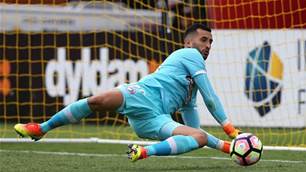FFA CEO James Johnson identified a strong demand to suspend grassroots football but insisted the governing body's plans for the professional game remain unchanged.
The FFA on Tuesday evening announced that all grassroots football under its jurisdiction – including National Premier Leagues, FFA Cup, youth, FFA-run school-based programs, MiniRoos and futsal – would cease at midnight and remain suspended until April 14 in an attempt to reduce participants risk of exposure to COVID-19.
The FFA CEO had just a day prior announced measures that would have seen grassroots and community football continue alongside the conclusion of the A-League season and W-League Grand Final under precautionary conditions.
However, following further meetings of a COVID-19 working group set up by the governing body and feedback from the Association of Australian Football Clubs (AAFC) and broader community, a change in policy towards the grassroots – but not professional football – has been reached.
“I think we need to look at them [grassroots and professional football] in different ways,” Johnson told a phone hook-up with journalists on Tuesday evening.
“And that’s not suggesting we won’t change our views on the professional game, I’ve said from day one we’re going to have to be responsive and continue to be responsive based on the evolution of the virus.
“Firstly, I think we need to look at the rest of the game differently because of its sheer size and scale, it’s 1.96 m participants playing every weekend. This scale will create more opportunities for the virus to spread.
“Secondly, we’re only starting our season at NPL and Grassroots level, so postponing seems like a logical way to move forward. At this stage, we would like to hope that the season would continue in April when we open it up.
“The professional game, on the other hand, the W-League we’re talking about one match, it’s a final and with respect to the A-League, we’re talking about the last six rounds.
“So, we’re at the back end of the professional season, there is not as much football that will be played and right now the feeling amongst the professional game does not represent the fear that is coming through the grassroots.”
While Johnson did acknowledge on the call that some players at the bottom of the Australian footballing pyramid had been forced into isolation as a result of COVID-19 - leading to some clubs withdrawing from fixtures out of precaution.
At his press conference on Monday, Johnson had refused to be drawn on what would happen should an A-League or W-League player test positive for COVID-19.
Since then, however, AFL boss Gillon McLachlan has said that Australian Rules’ peak competition – which has already seen its lower-tier competitions postponed – would be immediately be suspended should a player test positive.
Asked if the FFA’s position on a player testing positive had evolved over the past 24 hours, Johnson reiterated that football’s position hadn’t changed.
“Not since yesterday it hasn’t,” he said.
“It is an issue we’re working on with the league at the moment.
“Our position on the professional game has not been revised since the press conference yesterday our revision has been solely in respect to the NPL and grassroots and the rest of the pyramid.”
The announcement that grassroots football would be continuing on Monday led to much discontent amongst the Australian footballing community, particularly around issues of player safety and the viability of small clubs playing games without live gates or concession sales.
“We want to highlight that this feedback has been critical in our decision today,” Johnson said.
“We place the concern for the health and wellbeing of our participants at the heart of this decision and we’ve also tried to play a role in being a leader in the wider community.”
Johnson, who acknowledged the fear that existed in the community, ultimately identified five key drivers of the FFA’s move on the grassroots.
“The first is the strong view of member federations and the football community, which has wanted a strong decision and a unified voice from the top to the bottom of the game,” he said.
“Secondly, as a good and responsible citizen, we recognise that a sport with 1.9 million participants, the largest sport in the country, we need to have a significant role, and in our view a more significant role than other sports, in slowing the spread of the virus and, in turn, saving lives.
“The ongoing response form the broader and national Australian community is evolving fast and it's evolving on an hourly basis. So, we are trying to react to the speed this virus is moving at.
“Lastly, the recent material developments in Australia, which have changed the landscape significantly, which include both Victoria and the ACT declaring states of emergency and more and more schools, university and public sporting facilities closing has led to many of our participants in the past 24 hours not wanting to play football because of the virus, both players and clubs.
“We are disappointed, I am personally very disappointed, but we’re trying to reduce community gatherings, which we hope will slow the spread of the virus.
“We have done our best to listen to the voice of our football community and our football community has expressed its desire to contribute more to this nation and also what have wanted to unite to a whole of game strong response.”
Related Articles

Socceroo-in-waiting seals Championship deal

Fringe Socceroo swerves A-League to remain in Europe after Fulham exit













